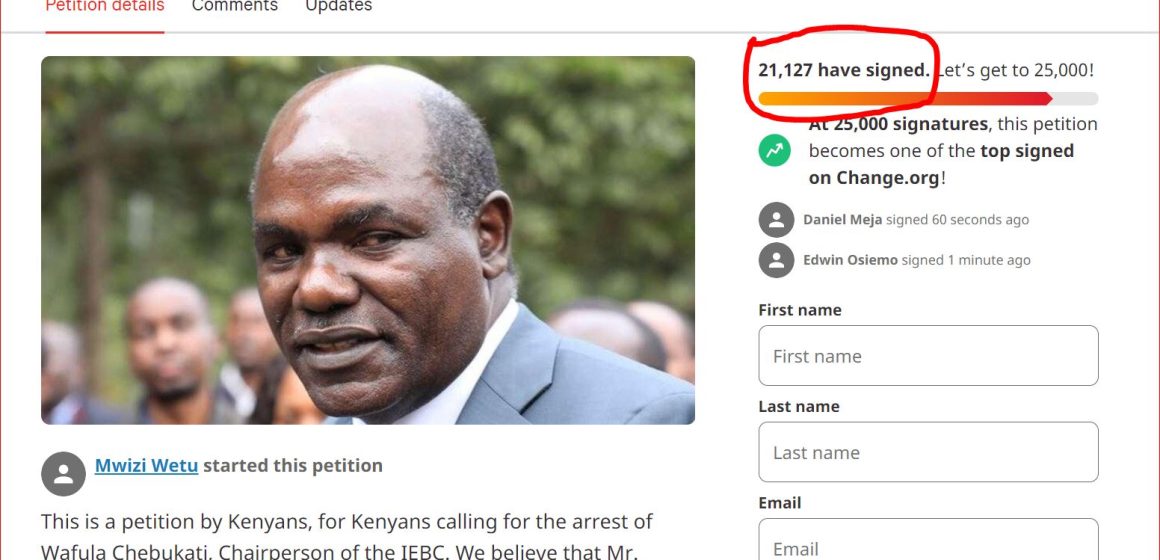|
LISTEN TO THIS THE AFRICANA VOICE ARTICLE NOW
Getting your Trinity Audio player ready...
|
A petition posted on Change.Org, calling for the arrest of Independent Electoral and Boundaries Commission Chairman (IEBC) Wafula Chebukati for bungling Kenya’s 2022 General Election, has gathered more than 22,000 signatures and is on track to hit 25,000 within 24 hours.
The petition, started anonymously by Mwizi Wetu, (Our Thief) clearly a fictitious name perhaps to cover their true identity out of fear of retribution, argues Chebukati, through his actions and inactions may have caused irreparable to the Kenyan democracy.
Change.org petitions are popular because they only require a name and email to sign and are easy to share on social media.
Entitled: “Calling for the arrest of Kenya’sKenya’s IEBC Chair Wafula Chebukati for bungling the 2022 polls,” the petition makes the following case in its opening paragraph.
“This is a petition by Kenyans, for Kenyans calling for the arrest of Wafula Chebukati, Chairperson of the IEBC. We believe that Mr. Chebukati’s conduct during the 2022 Presidential Election amounts to a criminal attempt to overwrite the will of the Kenyan people and install a President. We make these assertions based on five (5) points:” the petition stated in the first paragraph.
Kenyans, especially Azimio la Umoja supporters, watched in horror on Aug.15 when Chebukati declared Deputy President William Ruto the winner of the hotly contested election despite objections from all 4 IEBC commissioners who formed the majority.
The dissenting commissioners, led by Chebukati’s deputy Juliana Cherera, cited opaqueness as the reason they could not support Chebukati’sChebukati’s decision.
Chebukati exercised extra-judicial powers. As was held in the Maina Kiai case (2017), “there is no doubt from the architecture of the laws we have considered that the people of Kenya did not intend to vest or concentrate such sweeping and boundless powers in one individual, the chairperson of the appellant.” Petition Argument.
They alleged Chebukati failed to update them on the actual totals of the vote and denied them access to a “back-office” where he solely gathered and compiled the results he used as a basis to declare Ruto the President-Elect.
Chebukati has fought back with a post on the IEBC Twitter page, accusing the 4 commissioners of attempting to force a run-off. He declared that the power to announce the results is solely vested in him as the IEBC chairman.
The dissenting commissioners agreed that it was Chebukati’s role to declare and announce the results. Still, those results must be decided upon as a consensus or by a majority vote.
It’s clear Chebukati did not have the vote to declare Ruto the winner making his actions questionable.
Petitioners have also countered Chebukati’s justification for his actions in their third point.
“Chebukati erred in the Declaration of Final Results: Chebukati should have waited to achieve consensus with the other commissioners before announcing the results. In the absence of this consensus, only 1 Commissioner (Chebukati) signed the form, while 4 declined and 2 abstained.
The fact that 6 of the 7 Commissioners declined to affix their signatures to the form suggests that the IEBC did not believe in their veracity; only Chebukati did.”
This suggests two things. First, Chebukati’s results differ from those of the majority of the commission. Second, his results, affirmed by a minority, were the basis upon which the President-Elect was declared: the belief of a single man. Herein, Chebukati exercised extra-judicial powers. As was held in the Maina Kiai case (2017), “there is no doubt from the architecture of the laws we have considered that the people of Kenya did not intend to vest or concentrate such sweeping and boundless powers in one individual, the chairperson of the appellant.”






























LEAVE A COMMENT
You must be logged in to post a comment.